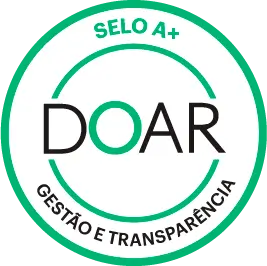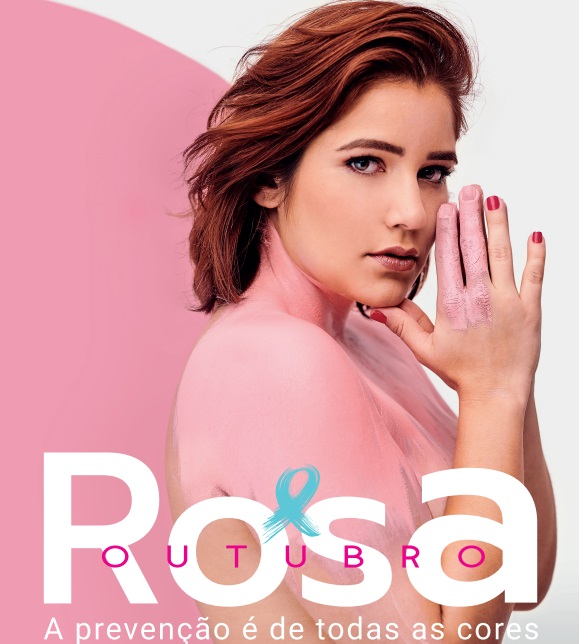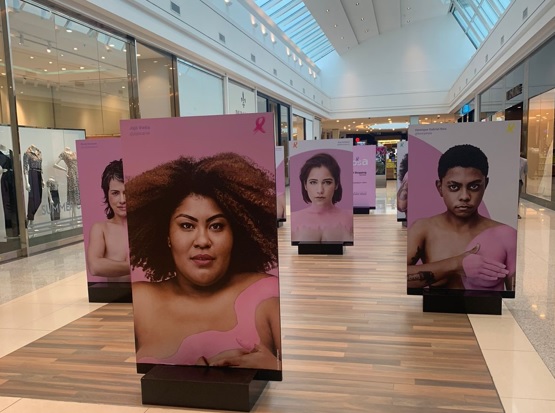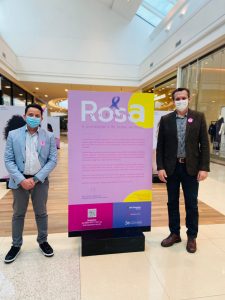This year’s Mário Penna Institute’s Pink October Campaign has the theme “Prevention is of all colors”. The association of the movement against breast cancer to the color pink brought significant gains to the campaign. However, since it was released, about 30 years ago, the world is no longer the same. Since then, there have been several other movements, other identities and other ways of perceiving oneself and the other. Therefore, Mário Penna created a more plural, more inclusive, more colorful campaign.
 When we say that prevention is of all colors and we give visibility to different aesthetic standards, we are not just embracing the cause of breast cancer, but a whole social issue. Resigning our views and questioning the constructed inequalities is urgent and everyone’s role.
When we say that prevention is of all colors and we give visibility to different aesthetic standards, we are not just embracing the cause of breast cancer, but a whole social issue. Resigning our views and questioning the constructed inequalities is urgent and everyone’s role.
Being a woman these days is more and more challenging and we, who are now at the head of the Mário Penna Institute, are committed to the history of our founders to always be by the side of those who are often not remembered.
MAMMOGRAPHIES – According to the National Cancer Institute (INCA), early diagnosis of breast cancer means a 95% chance of cure. Reaffirming its commitment to always taking care of society in the best possible way, in partnership with the Municipality of Belo Horizonte, the Institute is offering 2,000 free mammograms for women over 50 years old, who have not had the preventive exam in the last 12 months.
Scheduling must be made by calling 3349-1212, Monday through Friday, from 7:00 am to 7:00 pm; and on Saturdays, from 7am to 6pm.
Employees of the institution who also belong to this age group may take the exam through the Unimed Plan, without co-payment.
According to Dr. Kerstin Kapp Rangel, coordinator of the Mário Penna Institute’s medical residency, mammography should be performed annually by women in the age group indicated by the Ministry of Health, the Brazilian Society of Mastology and the Brazilian Society of Radiology, in order to make the diagnosis of the disease possible. in its earliest stage. “Mammography is the only test capable of reducing mortality from breast cancer by approximately 30%, as it allows for earlier detection of the disease, before the appearance of palpable changes. Thus, a cure after proper treatment can be obtained in more than 90% of cases. Breast cancer screening consists of the association of annual clinical examination and mammography. The self-examination is capable of detecting tumors around 2.0 cm, but the disease needs to be diagnosed well before that”; explains.
According to INCA data, in 2020, approximately 67 thousand new cases of breast cancer were diagnosed in Brazil. It is the most common cancer in women (almost a third of all cases).
Breast cancer is also the neoplasm that most leads to deaths in Brazil, with 18,068 in 2020. In Minas Gerais alone, 8,250 breast cancer diagnoses are estimated for the year 2021.
The main signs of breast cancer that can be noticed by women are nodules in the breast and/or in the armpit, especially if they are unilateral and painless; change in the nipples (retraction, redness and desquamation), if unilateral; spontaneous discharge from the nipple, if unilateral, clear as water or bloody.
It is necessary to be aware of hereditary risk factors such as a history of breast and ovarian cancer in 1st degree relatives (mother, sister or daughter), especially when at a young age, as well as breast cancer in a male blood relative. Women with a hereditary risk profile should start screening earlier and using specific strategies.
Measures related to lifestyle habits can reduce the risk of breast cancer, helping to prevent: regular physical activity; healthy and balanced diet; maintain proper body weight; do not smoke;3 and avoid excessive alcoholic beverages.
Last year, even with the pandemic, almost 9,000 mammograms were performed at Instituto Mário Penna. In addition, more than 13,000 patients were seen by breast cancer specialists.
PARTNERSHIPS
Several companies have already embraced the Pink October of Instituto Mário Penna and you can also participate and help in any way.
– BH Shopping: Takes the colors of Outubro Rosa to the 4th floor with the exhibition of the clicks of photographer Márcio Rodrigues and the models of the campaign.
– Brokolis do Brasil: Partner with other awarded projects by Mário Penna, the unmistakable producer Brokolis do Brasil gave life to VT that summarizes the innovative concept of the campaign “Prevention is of all colors”, created by the Casasanto agency.
– Instituto Galo: Honored as Benefactor Mário Penna, Instituto Galo joins this campaign by signing the video produced by renowned producer Brokolis and carrying out several awareness actions together with Mário Penna.
– Supermercados BH: In the year in which the largest supermarket chain in Minas Gerais celebrates its 25th anniversary, in addition to the partnership of Troco Solidário, this October Rosa is taking a campaign that raises hope. The entire DOVE line of products sold during the month of October will have 2.5% destined for the Institute.
– Lojas REDE: A partner for over 11 years with Troco Esperança, for the third consecutive year it will promote together with DOVE an action that will raise for the Pink October of Instituto Mário Penna. When purchasing 3 (three) DOVE brand products, in addition to contributing to the campaign, the customer receives a personalized and exclusive Ecobag.
– Chaos: Will dress the entire front line of care at Hospital Luxemburgo – Instituto Mário Penna Unit – with the shirt of the campaign.
– Luiza Barcelos: In addition to partnering in the dissemination of the message of prevention of breast cancer, the renowned brand from Minas Gerais will wear the Pink October shirt of Instituto Mário Penna in all its units in Brazil.
Do you also want to be a partner and enter this “pink and colorful wave of solidarity”? Contact us at (31) 3299-9310 or [email protected].
The Mario Penna Institute
The Mário Institute is made up of the Mário Penna and Luxemburgo Hospitals, Beatriz Ferraz Support House, Education and Research Nucleus (NEP) and Oncology Specialties Nucleus (NEO). 600 municipalities in Minas Gerais.
Classified by the Ministry of Health as a High Complexity Oncology Care Center (CACON), in 2020 the Institute also carried out 272 thousand radiotherapy applications, 34 thousand chemotherapy sessions, 55 bone marrow transplants and almost 11 thousand surgeries. In addition, it is at the forefront in the fight against Covid-19 and, for this, infirmary beds and other new ICU beds were created, aimed at treating patients with the disease.
Access the Hotsite: https://instituto.mariopenna.org.br/outubrorosa




 According to the National Cancer Institute (Inca), early diagnosis of breast cancer means a 95% chance of cure. Reaffirming its commitment to always taking care of society in the best possible way, in partnership with the Municipality of Belo Horizonte, the Institute is offering 2,000 free mammograms for women over 50 years old, who have not had the preventive exam in the last 12 months.
According to the National Cancer Institute (Inca), early diagnosis of breast cancer means a 95% chance of cure. Reaffirming its commitment to always taking care of society in the best possible way, in partnership with the Municipality of Belo Horizonte, the Institute is offering 2,000 free mammograms for women over 50 years old, who have not had the preventive exam in the last 12 months.
 Last Monday afternoon, October 25th, Mário Penna’s team was at Precon, in Pedro Leopoldo, for a chat with the company’s employees. Eliane Fraga, a patient from Entrelaçadas (the IMP’s support group for women with breast cancer) told a little about her fight against the disease, talked about the difficulties of recovery, and emphasized the importance of prevention and the annual mammography.
Last Monday afternoon, October 25th, Mário Penna’s team was at Precon, in Pedro Leopoldo, for a chat with the company’s employees. Eliane Fraga, a patient from Entrelaçadas (the IMP’s support group for women with breast cancer) told a little about her fight against the disease, talked about the difficulties of recovery, and emphasized the importance of prevention and the annual mammography.
 The president of Instituto Mário Penna, Marco Antônio Viana Leite, along with 11 breast cancer patients (As Entrelaçadas, a support group formed by women warriors who share their experiences), visited Atlético’s future “home”, where they were welcomed by mascot Galo Doido and by members of the board of the team and the Galo Institute.
The president of Instituto Mário Penna, Marco Antônio Viana Leite, along with 11 breast cancer patients (As Entrelaçadas, a support group formed by women warriors who share their experiences), visited Atlético’s future “home”, where they were welcomed by mascot Galo Doido and by members of the board of the team and the Galo Institute.
 When we say that prevention is of all colors and we give visibility to different aesthetic standards, we are not just embracing the cause of breast cancer, but a whole social issue. Resigning our views and questioning the constructed inequalities is urgent and everyone’s role.
When we say that prevention is of all colors and we give visibility to different aesthetic standards, we are not just embracing the cause of breast cancer, but a whole social issue. Resigning our views and questioning the constructed inequalities is urgent and everyone’s role.